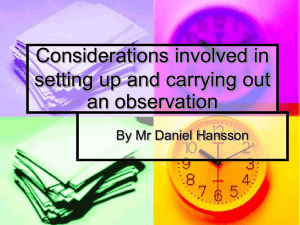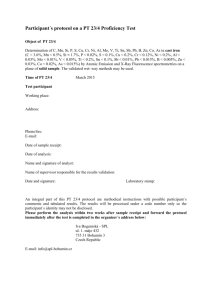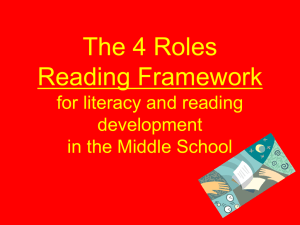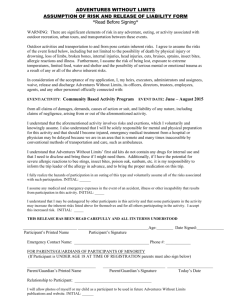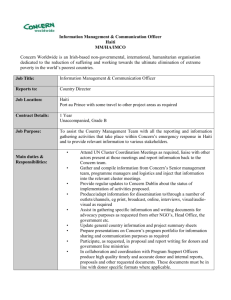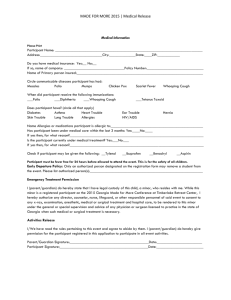ESAP-and-17th-Mid-Year-PCCP-Scientific-Program-Overview
advertisement
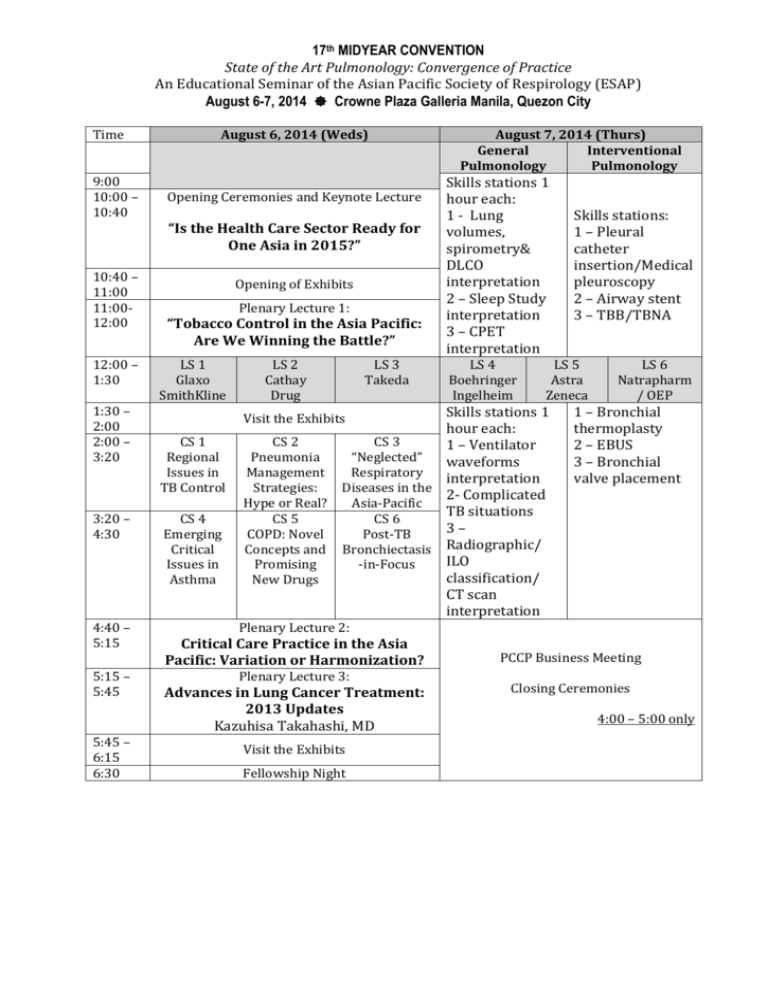
17th MIDYEAR CONVENTION State of the Art Pulmonology: Convergence of Practice An Educational Seminar of the Asian Pacific Society of Respirology (ESAP) August 6-7, 2014 Crowne Plaza Galleria Manila, Quezon City Time 9:00 10:00 – 10:40 10:40 – 11:00 11:0012:00 12:00 – 1:30 1:30 – 2:00 2:00 – 3:20 3:20 – 4:30 4:40 – 5:15 5:15 – 5:45 5:45 – 6:15 6:30 August 6, 2014 (Weds) Opening Ceremonies and Keynote Lecture “Is the Health Care Sector Ready for One Asia in 2015?” Opening of Exhibits Plenary Lecture 1: “Tobacco Control in the Asia Pacific: Are We Winning the Battle?” LS 1 Glaxo SmithKline LS 2 Cathay Drug LS 3 Takeda CS 4 Emerging Critical Issues in Asthma Skills stations 1 hour each: 1 - Lung volumes, spirometry& DLCO interpretation 2 – Sleep Study interpretation 3 – CPET interpretation LS 4 Boehringer Ingelheim Skills stations: 1 – Pleural catheter insertion/Medical pleuroscopy 2 – Airway stent 3 – TBB/TBNA LS 5 Astra Zeneca Skills stations 1 hour each: CS 2 CS 3 1 – Ventilator Pneumonia “Neglected” waveforms Management Respiratory interpretation Strategies: Diseases in the 2- Complicated Hype or Real? Asia-Pacific TB situations CS 5 CS 6 3– COPD: Novel Post-TB Concepts and Bronchiectasis Radiographic/ ILO Promising -in-Focus classification/ New Drugs CT scan interpretation Visit the Exhibits CS 1 Regional Issues in TB Control August 7, 2014 (Thurs) General Interventional Pulmonology Pulmonology LS 6 Natrapharm / OEP 1 – Bronchial thermoplasty 2 – EBUS 3 – Bronchial valve placement Plenary Lecture 2: Critical Care Practice in the Asia Pacific: Variation or Harmonization? Plenary Lecture 3: Advances in Lung Cancer Treatment: 2013 Updates Kazuhisa Takahashi, MD Visit the Exhibits Fellowship Night PCCP Business Meeting Closing Ceremonies 4:00 – 5:00 only 17th MIDYEAR CONVENTION State of the Art Pulmonology: Convergence of Practice An Educational Seminar of the Asian Pacific Society of Respirology (ESAP) August 6-7, 2014 Crowne Plaza Galleria Manila, Quezon City ESAP 2014 Convention Theme: “State-of-the-Art Pulmonology: Convergence of Practice” Didactic Sessions and Objectives (August 6, 2014) PS 1: Tobacco Control in the Asia Pacific: Are We Winning the Battle? o At the end of the session, the participant should: Be aware of the present status of tobacco control in the Asia-Pacific region Know the success and hindering factors in tobacco control that may be unique in the region CS 1: Regional Issues in TB Control Is TB Eradication in the Asia-Pacific Possible? o At the end of the session, the participant should: Know the present status of TB control in the Asia-Pacific Region Know current challenges in the eradication of TB from both the public health and clinical point of views Know currently employed and planned strategies for TB eradication in the Asia-Pacific region Promising Strategies Beyond DOTS o At the end of the session, the participant should: Know the challenges of the application of the DOTS strategy from its inception up to the current time Be aware of possible models or interventions aside from DOTS that may show potential in TB control highlighting their features and possible limitations “Personalized Medicine” in MDR-TB Management o At the end of the session, the participant should: Know the current status of drug resistance of TB Be aware of possible upcoming pharmacologic therapy and regimen for MDR-TB and their performance CS2: Pneumonia Management Strategies: Hype or Real? New Drugs for Old Bugs? o At the end of the session, the participant should: Acknowledge the current patterns of antibiotic utilization of physicians and drug susceptibility for common pathogens in pneumonia in the AsiaPacific region Be aware of the need for possible new drugs for pneumonia and appreciate the value of antibiotic stewardship principles Strategies Beyond Antibiotics: Impact on Mortality o At the end of the session, the participant should: Be aware of the potential benefits of non-pharmacologic treatment strategies for pneumonia and sepsis 17th MIDYEAR CONVENTION State of the Art Pulmonology: Convergence of Practice An Educational Seminar of the Asian Pacific Society of Respirology (ESAP) August 6-7, 2014 Crowne Plaza Galleria Manila, Quezon City Pneumonia Vaccines: Promise Fulfilled? o At the end of the session, the participant should: Know the quality of current evidence-based guidelines on immunization Appreciate the performance of pneumonia vaccines in terms of hard clinical outcomes such as preventing deaths and hospitalization CS 3: “Neglected” Respiratory Diseases in the Asia-Pacific Parasites and the Lungs o At the end of the session, the participant should: Know how to recognize common parasitic infections of the lungs Be informed of the basic principles of preventing and managing parasitic infections of the lungs “Farmer’s Lung” o At the end of the session, the participant should: Know pertinent epidemiologic data regarding Farmer’s Lung Know how to recognize Farmer’s Lung Know the management principles of Farmer’s Lung Post-disaster Pulmonology o At the end of the session, the participant should: Know the impact of disasters and calamities on respiratory health both from the individual and the public health point of view know strategies on how to prepare for disasters and calamities and how to mitigate its impact on respiratory health and the delivery of health services CS 4: Emerging Critical Issues in Asthma The Promise of New and Novel Drugs o At the end of the session, the participant should: Be updated on novel approaches in the treatment of asthma and upcoming molecules in the pipeline for the treatment of asthma Utility of Clinical Pathways o At the end of the session, the participant should: Know the quality of current guidelines for the management of asthma Know how clinical pathways may improve the management of patients with asthma highlighting approaches that may be feasible in the region “Reality-Based” Management in Asthma o At the end of the session, the participant should: Be aware of how principles of management of chronic illnesses could be employed in the management of asthma especially in a resource-limited setting Know diagnostic techniques and treatment strategies that may be employed to manage asthma in low-income setting 17th MIDYEAR CONVENTION State of the Art Pulmonology: Convergence of Practice An Educational Seminar of the Asian Pacific Society of Respirology (ESAP) August 6-7, 2014 Crowne Plaza Galleria Manila, Quezon City CS 5: COPD: Novel Concepts and Promising New Drugs Molecular Insights Into COPD o At the end of the session, the participant should: Be informed of current molecular knowledge on COPD Appreciate how these molecule-based knowledge may aid in the management of stable COPD and possible exacerbations New Treatment = Better Outcome? o At the end of the session, the participant should: Appreciate the evidence behind new and novel COPD treatment Acknowledge how these “new” modalities fit into currently acceptable guidelines Updates on Smoking Cessation Guidelines o At the end of the session, the participant should: Know the current updates in terms of smoking cessation Acknowledge the regional factors that may make the applications of these guidelines challenging CS 6: Post-TB Bronchiectasis-in-Focus Is Effective Medical Management Available? o At the end of the session, the participant should: Be aware of current medical management of post-TB bronchiectasis with due appreciation of their potential benefits and limitations Role of Maintainance Bronchodilator Therapy o At the end of the session, the participant should: Be able to examine the evidence behind bronchodilator use in post-TB bronchiectasis Appreciate the outcomes that may be affected by maintenance bronchodilator treatment Outcome of Interventional Radiology for Hemoptysis o At the end of the session, the participant should: Appreciate the role of interventional radiology on hemoptysis Be aware of the evidence and outcomes behind this intervention PS 2: Critical Care Practice in the Asia Pacific: Variation or Harmonization? o At the end of the session, the participant should: Appreciate the current practice of critical care medicine across the region Know current factors that affect the trends of ICU practices in the AsiaPacific Be aware of the challenges in ICU care in the region PS 3: Advances in Lung Cancer Treatment: 2013 Updates o At the end of the session, the participant should: Be aware of the 2013 updates in lung cancer management Know the current challenges in applying these guidelines in the region

